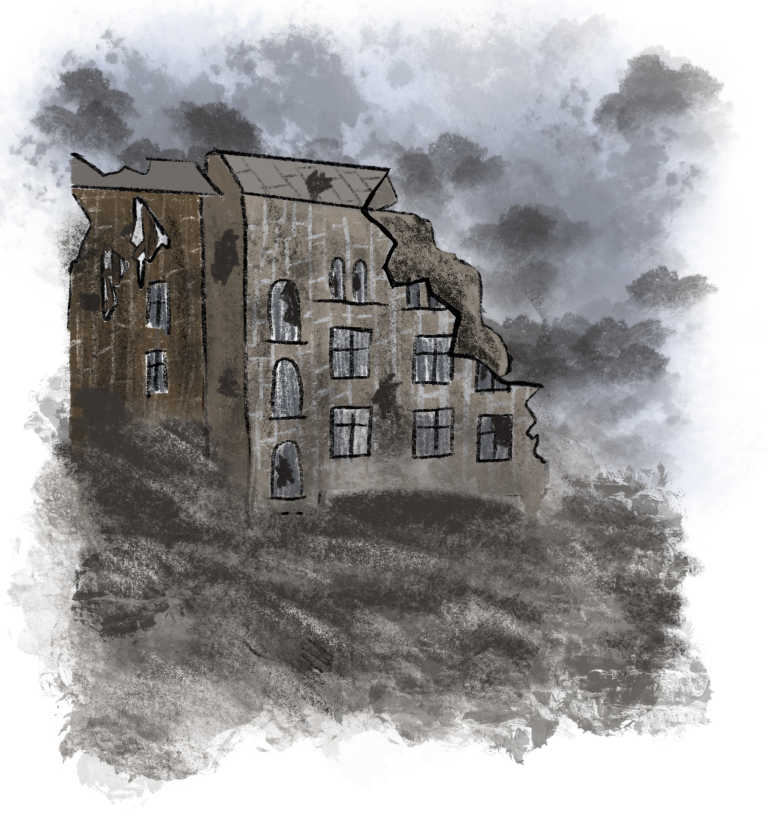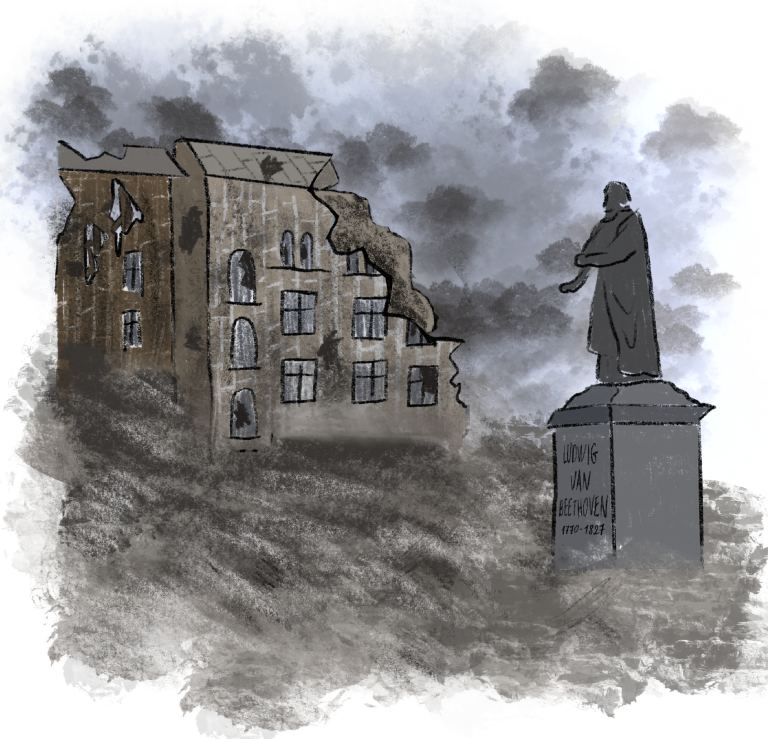
When the war started, he was already dead. When the war ended, he was one of the few survivors.
Episode 1 - The Resurrection
Short Summary
The first episode of the Danetkas – Music Stories podcast, titled “The Resurrection,” presents a riddle about a composer who was already dead when the war started but became one of the few survivors when the war ended.
Mr. Rigoletto provides tips to solve the riddle, mentioning the destruction caused by war and a clue about something made of stone.
The answer reveals that the composer is Ludwig van Beethoven, and the surviving element is a statue built in his memory in the German city of Bonn. Despite the heavy bombing during World War II, Beethoven’s statue remained miraculously intact.
The podcast explores Beethoven’s significance in music history, emphasizing his transition from the Classical to Romantic period and his innovative contributions to musical composition. The episode concludes by discussing the possible reasons the statue survived the bombing.
Welcome to the Danetkas – Music Stories podcast episode 1
The resurrection
I will start by reading the riddle to you.
Each riddle it consists of the title which in this case is “the resurrection”
It consists of an image. I will describe the image for you the image is building in Ruins. Maybe a destroyed building if you want to see the image please download our app Danetkas and you can have access to this image.
Here is the riddle: When the war started he was already dead when the war ended he was one of the few survivors.
The obvious question is how does a dead person survive War
Instead of directly reading the answer I will first read the tips that Mr Rigoletto will provide
The first tip says: war destroys almost everything.
So the first tip tells us that this story is about a war and that the war destroys almost everything . So something the war didn’t destroy.
So it relates to our image so there is a damaged building so Mr. Rigoletto is pointing at us that there is a war happening here.
So you can try to guess what might have happened.
There is a second hint second Rigoletto to which I will say: My Heart Is Made of Stone
Hmm… something is made of stone what can be made of stone hmm think a bit about it the third rigoletto says: Ha! you missed!
So we have a war that happened
We have something made of stone
And there was a shot or something that was missed so maybe this thing made of stone didn’t get destroyed
Hmm… how does this relate to the composer how can a composer survive the War? I will repeat the hint:
When the war started he was already dead when the war ended he was one of the few survivors.
I will now read the answer for you:
A very famous composer died and people decided to build a statue in his memory later a war started and the City was destroyed however the statue remained intact during World War 2 the German city of Bonn was heavily bombed the a third of the City was destroyed but the statue of German composer Ludwig van Beethoven remained miraculously intact despite the surrounding destruction.
So that’s how composer that was already dead survived a war
The statue of the composer survived the war Ludwig van Beethoven
Here’s some additional information about Beethoven. Beethoven was born in the German city of Bonn and his statue was unveiled the 12th of August of 1845 celebrating the 75th anniversary of the composer’s bird the city was heavily bombed on October 18th 1944 by the allied forces so Beethoven was already dead for a long time.
Bonn was destroyed and had to be rebuilt many photos survived and portrayed the destruction in the center of bonn. The statue of Beethoven miraculously remained intact you can easily find online the original photo that served as the basis for the illustration present in the Danetkas app.
Bonn was the capital of West Germany from 1949 to 1990. After the second world war Germany was separated into two states: East Germany was controlled by the Soviets and West Germany was controlled by the Allies even though Berlin is now the official capital of Germany, the German federal government still maintains a substantial presence in Bonn.
In the personal note I leave quite close to the German city of Bonn
So I’ve been there many times and every time I go there when I arrive at the main station right next to it there is the Monumental Beethoven’s statue.
I’m originally from Portugal and I’ve been listening to classical music specifically many German composers throughout my life. But somehow it always felt decent to me but once I was there in Bonn and I saw Beethoven statue and I saw how so many cafes pharmacies and shops are called Symphony Sonata Ludwig I see that Bonn has a great pride in this composer
Why was Beethoven so important? In short he made the transition from The Classical period which features the music of Haydn and Mozart to the Romantic Period and Beethoven changed a lot of things in the musical Realm.
Before Beethoven composers would usually work for the aristocracy or the church.
We see this in many famous composers Johan Sebastian Bach worked for the church
Wolfgang Amadeus Mozart worked for the aristocracy. But Beethoven worked for himself he had many patrons. Patrons were rich people that would pay him for him to compose music he was one of the first composers to actually live off of this patronage system so he wouldn’t have one boss one Aristocrat that he had to serve, who basically would have to serve many aristocrats.
He would have many fans and these fans would pay money for his sheet music
And for his concerts he did many Innovations in terms of Harmony, Melodies maybe one thing that might be surprising for nowadays listeners is that he’s famous 9th Symphony featuring a choir and Orchestra was revolutionary at the time.
Usually symphonies would only feature the orchestra not the choir. But for the first time it featured the choir with the orchestra he also featured many unusual instruments at the time like the trombones that are featured in the last movement of the Ninth Symphony.
In the Symphonies of Mozart and Haydn we rarely or never see the use of trombones, for example in the symphonies.
And let’s of course not forget the most common musical fact which is that he was deaf but how can a deaf composer write symphonies?
Beethoven was not deaf from birth, he learned music the same way everyone learns music which is by hearing music however as people get old they start to get hearing loss and that was the case with Beethoven he had severe hearing loss.
By the end of his time he was profoundly deaf.
However he still had is internal ear so he could imagine in his mind the notes and that’s how he wrote music despite being deaf.
If you want to hear more about Beethoven please listen to our future podcasts because there is another Danetka featuring the famous Ludwig van Beethoven.
Going back to the beginning and talk a bit about the Statue are with miraculously survived how did it stay intact how did it not collapse was it divine intervention or was it pure chance
Actually when a city is bombed many strategic places are targeted to not be bombed. If all the important monuments are bombed the city is unrecognizable and it’s very hard to orientate yourself around the city if everything is destroyed. So very often some specific spots are targeted by military to not be bombed.
That is a possible explanation of how the statue remained miraculously intact even though everything around it was completely destroyed.
We reach the end of our first episode The Resurrection. I will repeat the riddle one more time so you can play with your friends. Now you will be the master and they, your friends, will be the investigators. Just tell them the following sentence:
When the war started it was already dead when the war ended it was one of the few survivors.
Have fun playing the Danetkas and thank you for listening and bye-bye.
